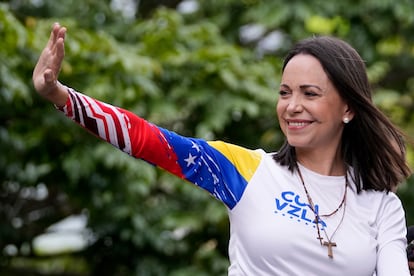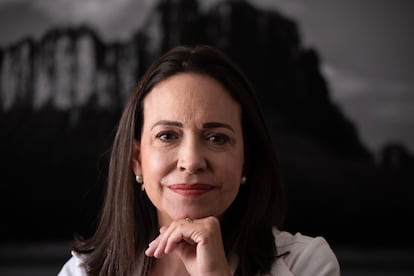María Corina Machado: ‘Maduro must be made to understand that his best option is to accept a negotiated transition’
In an interview, with EL PAÍS, the Venezuelan opposition leader says she’s convinced that a change in the country is possible this time: ‘Our records are available for anyone who wants to analyze them’

“Can you imagine if we had all the vote records scanned on the Internet and if you entered the number of your ID card in a web page and the image of the voting certificate of your center appeared? Wouldn’t that create more confidence? That is what it is all about, that as citizens we can face and overcome the obstacles placed by the National Electoral Council to the transparency and confidence of the electoral process.” María Corina Machado (Caracas, 56 years old) did not make these statements on Friday, during the interview with EL PAÍS. They are not even recent, although they summarize the plan with which she has put Nicolás Maduro in check after the elections of last July 28. The Venezuelan opposition leader made these statements 16 years ago, in 2008, when she had already specialized in electoral transparency issues and Hugo Chávez was in power.
Recalling that interview, a video that has gone viral this week, is the only moment in the half-hour conversation in which Machado grants a smile. It is 9.00 a.m in Caracas when the videoconference is activated and the Venezuelan politician appears seated on what looks like a sofa and a white wall behind it. She makes sure that there is no detail that could give an idea of where she is. It has been more than a week since she decided to take refuge, to live in semi-clandestinity —after attending the August 3 demonstration in Caracas—, facing the threat of being arrested. The Venezuelan Attorney General’s Office, controlled by chavismo, opened a criminal investigation against her and Edmundo Gonzalez Urrutia after they published a press release asking the Armed Forces to cease repression, a text that the opposition presidential candidate —she was disqualified by chavismo — signed as president-elect.
The case, Machado believes, is part of the “brutal” repression — she repeats the term on more than one occasion — that the Venezuelan government has unleashed since July 29, one day after the presidential election and in which, according to Maduro himself, more than 2.000 people have been detained.
That early morning, the National Electoral Council, also in power of the ruling party, proclaimed Maduro the winner of the elections, although two weeks later it has not shown any proof of his triumph. The opposition, on the other hand, has published almost all the vote records after the collection made by witnesses in the voting centers, an operation in which hundreds of thousands of people were involved, Machado assures. Those minutes, scanned and uploaded to a web site, with verifiable data and votes table by table, show Edmundo Gonzalez as the winner with 67% of the votes, against 30% for Maduro. The publication of these minutes has led several countries, among them the United States, and organizations such as the Carter Center to recognize Edmundo Gonzalez as the winner.
“Obviously we were prepared, there have been dozens of elections with fraud and cheating of different magnitudes and we had never had the evidence in hand. This time we said: ‘It’s going to be different’,” celebrates Machado, once for many the representative of the most extreme sector of the Venezuelan opposition, supported by the most reactionary leaders in the world; today undisputed leader and unifier of the entire spectrum seeking a change in the Caribbean country.
Two weeks have passed since the elections, a time that in the convulsed Venezuela is equivalent to months in any other place on the planet. With Maduro entrenched, the opposition leaders under protection and the population immersed in the fear and uncertainty generated by the fact that the country has entered an unknown terrain, all eyes are on the attempts of Brazil, Colombia and Mexico to try to reach a negotiated solution to the crisis.

Question. What comes next?
Answer. In 25 years we have never been here, with the regime so weak and us so strong. The farce that this is a polarized country is falling, the bases of Chavismo are with us, the bases of the Armed Forces are with us. We had already given them the social defeat, we only needed to ratify it with numbers so that the whole world would know what we already knew. Today Maduro has no legitimacy as a result of his repressive escalation, which is the only thing he has left. He is more and more rejected, including by his allies, this has not happened before. Maduro is not evaluating his options correctly, he is entrenched around a military leadership that is capable of doing a lot of damage, as he has demonstrated. The challenge is to make Maduro understand that his best option is to accept the terms of a negotiated transition. Many countries, many governments are aligned around that.
Q. Brazil, Colombia and Mexico are trying to promote a negotiated solution to the crisis. Most of the international community has united around this initiative. Can it be said that negotiations are already underway?
A. We can already talk about transition, I do not know if it is a negotiation. For a negotiation to take place, both parties must be willing. We are determined, with four conditions. First, a negotiation based on respect for the popular sovereignty of July 28. I believe that this is a position that unites all the countries of the world when they say that there must be an impartial verification of the vote records. Ours are available so that whoever wants to analyze them, verify them, can do so, that is why our database is open. Second, it is a negotiation for the transition, not for power sharing or other ideas that have arisen. Third, it is a negotiation in which we are willing to give guarantees, safe-conducts and incentives (to Maduro and Chavismo), about which I am not going to elaborate because it is obviously inconvenient to do so and it would be the subject of the negotiation itself. Fourthly, a negotiation in which the country that elected its leaders and representatives feels well represented.
Q. That scenario is still a long way off. What is the priority objective?
A. Stop the repression. If there is something I have to ask the international community is that this has not had the denunciation it deserves. We are talking about Maduro bragging daily that he has more than 2.000 people detained, they are taking electoral witnesses from their homes, they are looking for those who were volunteers on election day.
Q. What are the red lines, what is non-negotiable?
A. The result of July 28 is non-negotiable, popular sovereignty is non-negotiable. How is it possible to have another election? There has already been one here, under the terms of the regime, with an absolutely unequal campaign. We went under their terms, with their machines, with their records... The records we have are official documents of the CNE. Under their rules, we won, the world knows that we swept.
Q. The three countries that are pushing for an exit are governed by the left, in the ideological antipodes of you. What confidence do they inspire in you?
A. There is clarity in the world that Venezuela is not an issue of left and right. It is a discussion, a struggle, much more transcendent. This has to do with freedom against totalitarianism; with justice against the most corrupt regime on the planet; with democratic stability against a regime that shakes the stability not only of Venezuela, but of the region. It has to do with essential human rights issues. About Venezuela there is a very important alignment even in countries with enormous tension, such as the United States. Or in Europe, on how many issues is there absolute unanimity among the 27?
Q. But what do you think of the role of Brazil, Colombia and Mexico?
A. I have to recognize that the behavior of these countries since before the electoral process has been correct. They have contributed at crucial moments to make it clear to Maduro that not to celebrate the electoral process was a red line. I recognize this and I am grateful for it. The only one I have not interacted with is the Government of Mexico. Since the election, the countries that have recognized Edmundo’s victory have taken a correct position, but I can understand that there are countries that have a more prudent position to maintain the communication channel with the regime. I am a liberal, everybody knows what I think. But beyond ideological affinities, those three countries understand very well that the only thing left for Maduro is violence, as he warned. These three countries understand the enormous danger for Latin America if Maduro tries to hold on to power by force. That would produce a migratory wave of three or four million people in the short term.
Q. In the first conversation held by the presidents of those countries, it was suggested that Edmundo González should be at the center of the negotiation. Would you be willing not to be in the center, to cede protagonism?
A. At the center are the Venezuelans, and Edmundo is the president elect. Now, the reality is that it is the Venezuelans who elect their representatives, they did it in the primaries and on July 28. It is Edmundo and I who have the responsibility and the legitimacy, and it is not the international community who chooses the representatives of the Venezuelans. Much less Maduro, who has done so in the past. Edmundo and I are a team, an indissoluble block.
Q. There is another group of countries and leaders, such as the Argentine Javier Milei and other Latin American presidents and former presidents, who have always given you their support and ask for much more drastic solutions, who are not in favor of a negotiation or want more sanctions against Chavismo. What do you say to them?
A. We all want the same thing, we all want a peaceful and orderly transition. Many of them have insisted that it is an urgent process. Today Maduro feels that the cost of repression is zero, that he can kill young people, disappear leaders, and the cost is zero. He must be made to understand that the cost of repression is high and therefore his best option is to accept the terms of a negotiated transition.
Q. Edmundo González signed a statement this week as “president-elect," which has generated a lot of controversy, bringing to mind Juan Guaidó, who proclaimed himself interim president of Venezuela in 2019. What did he think?
A. I answer you using the words of the Chilean president, Gabriel Boric. Here the self-proclaimed one is Nicolás Maduro. Edmundo Gonzalez is the elected president because that is what the results and the official records show. Let’s not mix things up, because the experience of the interim has nothing to do with what is happening now, which is the product of more than 12 million people who voted. Venezuelans know that and so does the world.
Q. Who do you trust within Chavismo and the circle close to Nicolás Maduro?
A. I don’t know anyone in Maduro’s inner circle. It is no longer a matter of trust, but of alignment of incentives. They do know that I am a person of my word and they know that I keep it.
Q. Do you think they are going to arrest you or Edmundo González?
A. In Venezuela everything is possible, I feel that in his desperation Maduro has opted for the most dangerous way, to entrench himself, to surround himself with a high military command. I think it is a huge mistake on his part and a huge risk for Venezuelans.
Tu suscripción se está usando en otro dispositivo
¿Quieres añadir otro usuario a tu suscripción?
Si continúas leyendo en este dispositivo, no se podrá leer en el otro.
FlechaTu suscripción se está usando en otro dispositivo y solo puedes acceder a EL PAÍS desde un dispositivo a la vez.
Si quieres compartir tu cuenta, cambia tu suscripción a la modalidad Premium, así podrás añadir otro usuario. Cada uno accederá con su propia cuenta de email, lo que os permitirá personalizar vuestra experiencia en EL PAÍS.
¿Tienes una suscripción de empresa? Accede aquí para contratar más cuentas.
En el caso de no saber quién está usando tu cuenta, te recomendamos cambiar tu contraseña aquí.
Si decides continuar compartiendo tu cuenta, este mensaje se mostrará en tu dispositivo y en el de la otra persona que está usando tu cuenta de forma indefinida, afectando a tu experiencia de lectura. Puedes consultar aquí los términos y condiciones de la suscripción digital.









































